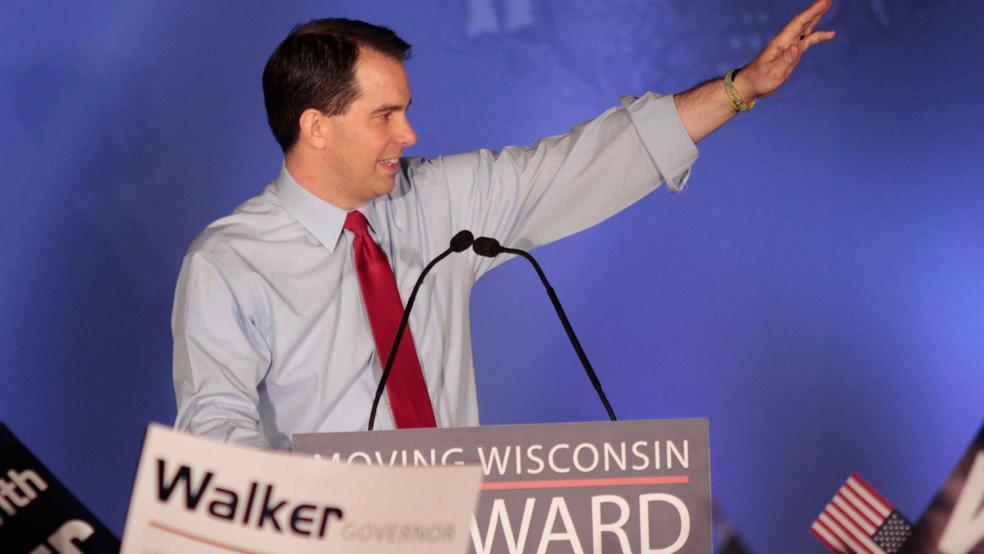It seems eons ago that Wisconsin Gov. Scott Walker wowed an Iowa audience of grass roots conservatives in late January and sparked a groundswell of support for his Republican presidential bid.
Pacing a stage in Des Moines with his shirtsleeves rolled up, Walker repeatedly brought the crowd to its feet with stories about his successful battles with Wisconsin labor groups and his vows to shrink government and return power to the states.
Related: Replace Obamacare with What? GOP Candidates Start Slinging Proposals
Fast forward to last Monday, when he spent 20 mostly frustrating minutes on a soapbox at the Iowa State fair, shouting into a microphone to try to be heard over the catcalls of liberal hecklers and protesters with signs. He then lamely – and somewhat incoherently – sought to align himself with the views of high-flying Donald Trump to deny citizenship to the children of illegal immigrants who are born in this country.
While Walker once personified the political clout and energy of governors in shaping the outcome of the 2016 GOP presidential campaign, he now is in a stunning tailspin in the polls and fundraising that threaten his once promising prospects. And his tepid performance in the first nationally televised GOP debate in Cleveland Aug. 6 didn’t help matters.
Walker trails Trump, Jeb Bush and Ben Carson in the Real Clear Politics cumulative polling averages with just 7.7 percent of the Republican vote. Meanwhile, his candidacy was barely a blip in the latest Quinnipiac survey of three important swing states – Florida, Ohio and Pennsylvania – that was released on Thursday. He scored a mere 4 percent among GOP voters in Florida, 2 percent among Ohio Republicans and 5 percent in Pennsylvania.
“The first Republican debate mattered,” said Peter Brown, assistant director of the Quinnipiac poll in a statement. “Scott Walker gets very low debate grades and all but disappears from the Republican primary list.”
Related: Scott Walker’s 2016 Prospects Keep Soaring in Iowa
There is little doubt that Walker – like many other would-be presidents in the crowded GOP field – has been devastated by the Trump campaign juggernaut. The billionaire real estate businessman and reality TV showman has drained the conservative base of much of its support. And as The New York Times noted yesterday, Walker also failed to take advantage of his early lead in Iowa by building a campaign infrastructure ahead of next January’s crucial caucuses.
It was almost as if Walker had become so enamored of his flattering press clippings and his early successes in the polls that he saw no need to do the tough organizing work in Iowa’s 99 counties necessary to prevail in the caucuses. By the time he woke up to the fact that he was losing ground, Trump had already swept to the lead in the presidential contest nationally and began investing his time and money in building an organization in Iowa.
There was no way Walker or anyone else could top the billionaire arriving at the state fair last weekend in a black helicopter with his name emblazoned on the side.
Related: Five Obstacles to Scott Walker’s Presidential Bid
Walker spent months this year campaigning as an everyman Washington outsider – someone who once bought a sweater for $1 at Kohl’s Department Store and who distained business as usual in Washington. But the two-term governor got caught in the political crosswinds when Trump, Ben Carson and former Hewlett-Packard CEO Carly Fiorina began tapping into a vein of angry, disenchanted conservative voters who didn’t like office holders of any kind.
But there was more to his decline than that. Walker in the early going was a Johnny One-Note, citing his early successes as governor in stripping state workers of their collective bargaining rights and surviving a recall election as validation of his credentials to lead the nation – and to tackle any imaginable challenge, including defeating ISIS.
Despite all the tutoring he subsequently arranged with Elliott Abrams and other international policy experts, Walker never quite shook the image of being a lightweight after his awkward appearance before a foreign policy think tank in London, where he refused to take questions on the war in Iraq and Syria or any other controversial topic.
Related: Scott Walker gets a crash course in foreign policy
Some experts caution that it is far too soon to rule Walker out. “It's a long campaign, and candidates go up and down on the roller coaster frequently,” said Larry Sabato, a political scientist with the University of Virginia. “It is far too soon to be making grand pronouncements about Walker or most of the others. Walker has money, organization and a fairly good ideological positioning in the GOP field. Future debates and a shakeup in the candidate lineup -- which is coming, obviously -- can and will affect his standing.”
For now, however, Walker is trying desperately to put some energy back into his bland campaign and remake his image as a tough-talking, anti-establishment figure like Trump.
The Washington Post reported that during a conference call with some of his top fundraisers on Monday, Walker declared: “We need to step it up and remind people that we didn’t just take on the unions and Democrats, we had to take on my own party establishment, those who did not want to take on the status quo.”
Good luck with that.





